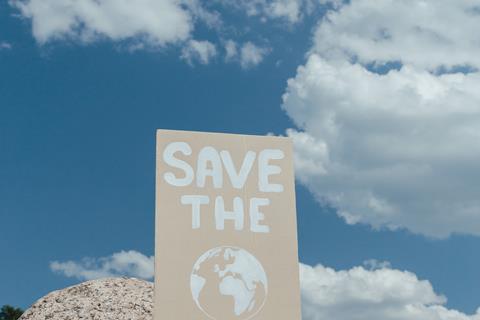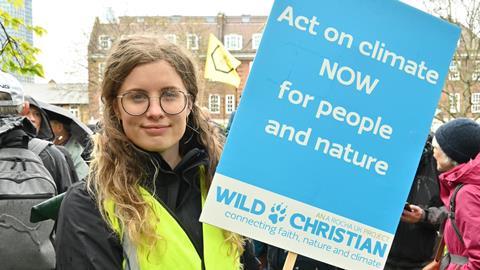Environmental campaigner Hannah Eves is the policy coordinator for A Rocha UK, Britain’s only Christian conservation charity. Here she shares her belief that we are intimately connected with God, his earth and each other

You have a brownie in your hand. Momentarily, of course, as who holds a brownie for long? Before long, it’s in your mouth and you’re enjoying the intensely chocolatey moment. And that’s all it is, an enjoyable moment; perhaps shared with friends over a coffee. Should eating a brownie be anything more?
Without wanting to get too philosophical about the brownie, what if we stop and think for a moment about what happened before? The farmer who harvested the wheat; the chickens kept for eggs; the cocoa beans grown hundreds of miles away, and the hands that picked them… There is an interconnected web of people, plants, animals and earth that contributed to it being in your hand.
The significance of connection
Meaningful connection and community have always been central to my faith – my home church in Northern Ireland felt like an extension of my family. I believed because I belonged; faith in Jesus came naturally. That was, until my teenage years, when what once felt simple and obvious morphed into something confusing and complex. I grappled with questions of justice and I felt a strong need to question everything. All the ‘shoulds’ and ‘shouldn’ts’ of a faith-filled life (as I was led to believe) felt devoid of convincing whys. With no answers to root me, I drifted, until my need for certainty was outweighed by my longing for connection and relationship.
When studying History and Politics at the University of Nottingham, I went along to a group called Navigators where my questions were embraced and echoed. And as I explored, on my own and with others, I rediscovered faith. My faith became vibrant in the context of community.
Environmental issues affect everything
At this point in life, the environment was lower down my hierarchy of concerns. I knew environmental issues were important, but it was conversation around relationships and justice that enthused me and made me want to respond. At that point, I hadn’t acknowledged how inextricable these topics are, and it was almost by accident that I found out.
Fresh out of university, I began a graduate programme at the Jubilee Centre, a charity exploring a biblical basis for public life. I was part of a group research project focusing on food, relationships and the environment. We looked at the issues around food systems, the theology of food and eating, and made recommendations for individuals, businesses and policy makers. This was a turning point for me. I began to see how fundamentally important the environment is to the political issues of today, and how addressing these issues impacts everything – from health and wellbeing to our food systems.
Environmental change…must be a collective response
I also realised that, theologically, our relationship with God and each other compels us to take environmental action. Psalm 104:14-15 reads: “He makes grass grow for the cattle, and plants for people to cultivate – bringing forth food from the earth: wine that gladdens human hearts, oil to make their faces shine, and bread that sustains their hearts.” What an incredible gift creation is! And we are part of it; we cannot live as if we are separate.

Becoming intentional
Instinctively, I slowed down. I began to think about how I was moving in the world, and how my impact matters. I stopped, prayed and began to consider my small daily actions. A brownie was no longer simply an enjoyable moment for me, but it became an opportunity to be conscious about the supply chain, and issues of fair trade and justice. It was the start of a slow mindset shift towards careful, intentional, small-life changes that acknowledge our interconnectedness with the earth and with each other; like becoming vegetarian, recycling, cycling to work and taking the slow route back to Northern Ireland for visits when I can.
Our decision makers reached an agreement that moved us an inch when we needed to move miles
A change was occurring. It happened instinctively when I began to genuinely appreciate the natural world around me. I knew I needed to live my life with integrity regarding environmental issues. But at the same time, I was aware that this is not about me. I could become dogmatic about my own actions, slipping into a form of environmental purity culture, but to do so would be to miss the point. Ultimately this was not an individual issue. Environmental change can never come from the intentional efforts of one, it must be a collective response.
Getting involved in the collective response
In 2020 I began working for A Rocha UK as an executive assistant. A Rocha UK have three streams of work: mobilising individuals to respond to the climate crisis; coming alongside churches to empower them to make changes and speak out about God’s creation; and working with Christian landowners to equip and encourage them in their conservation efforts. I wanted to observe, learn and absorb more from those working towards environmental change. God clearly placed me where I needed to be to learn what I needed to learn. Before long, I was heavily involved in campaigning, advocacy and policy, compelled by the possibilities of our collective response.
I became very involved in A Rocha UK’s Climate Sunday campaign; a movement bringing together churches of all denominations in the lead up to COP26, the United Nations climate change conference that was held in Glasgow in 2021. Individually, the prospect of speaking into such a space felt impossible. But together, we could make our voices heard. Over 2,000 churches took part in Climate Sunday, together declaring our responsibility as stewards of God’s earth. Such a collective effort filled me with so much hope. It still does.
We needn’t feel paralysed; there are things we can do to have a slow, yet significant impact
The reality of COP26 was hard. My hope-filled enthusiasm was temporarily crushed. I walked around the streets of Edinburgh (where we were staying) following the event, needing to walk off my feelings of frustration and extreme disappointment. When faced with an extraordinarily urgent issue, our decision makers reached an agreement that moved us an inch when we needed to move miles. The realism and continued perseverance of environmentalists around me, who had been fighting for these issues for many years, helped curb my devastation and keep me going. But, ultimately, I knew I needed to rest in the confidence that God is active in his earth. He knows what he is doing.
What can you do?
These are huge issues, but we needn’t feel paralysed; there are things we can do to have a slow, yet significant impact.
Think of a series of concentric circles. You are in the middle of the circles – the first thing to consider are small changes you can make within your home, the things you purchase, the food you eat. The circle surrounding you is your local community. How can you join in the efforts around you, run by your parish or local council, to care for your immediate environment? The third circle represents the national response. Discover national campaigns you can participate in or ask questions of your local MP to see what they’re doing to respond.
Finally, you reach the circle representing the global level. What is your government doing on the world stage and how can you hold them to account? A Rocha UK’s Wild Christian programme helps you to work through all these stages with practical action and a community to share all the many joys and frustrations of advocating for creation.
All the while, we need to remember that the Christian call to environmentalism is twofold. We are called to be stewards of God’s beloved earth, and we also are called to love justice and speak up for those who are least to blame for the climate crisis and yet end up as the ones who suffer.
Our collective efforts will bring change. There is no problem insurmountable for God.
To find out more about A Rocha visit www.arocha.org.uk




























No comments yet